It looks like you're using an Ad Blocker.
Please white-list or disable AboveTopSecret.com in your ad-blocking tool.
Thank you.
Some features of ATS will be disabled while you continue to use an ad-blocker.
share:
Below, at a Tibetan stupa near to Kathmandu we see a representation of a Dorje, the ultimate weapon of the Deva. The Dorje is a cosmic weapon the
tradition of which goes back thousands of years, the earliest accounts have it as an intelligent weapon that flew as a falcon and could unleash
devastating force, giving its wielder supremacy.
.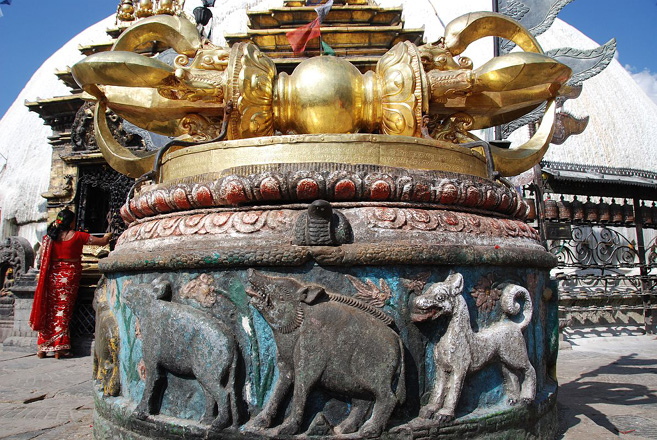
It needs to be considered how such traditions could have developed and whether such a device ever flew above the skies of the Earth in ancient times, of other wordly origin.
In tracing the history of this artifact and its representations, one finds the earliest mention dates back as far as writing itself, to the time of the Sumerians.
It is written about in connection with a campaign of the Sumerian city of Lagash in the 3rd millenium Bc, against the Elamite mountain dwellers on their Eastern border, and wielded by their God of war, Ninurta.
Here it is refered to as the Sar-Ur or Sharur.
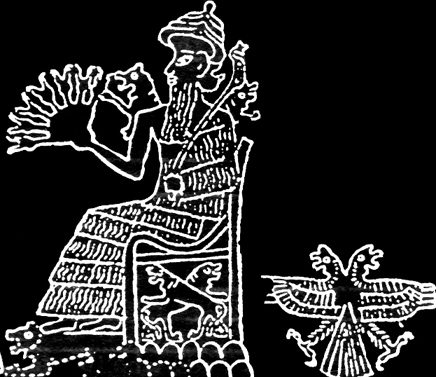
Above we see Ninurta holding a seven headed representation of the Sarur, at this point it can be noted that when the 'mace' is in aggresive mode it's serpentine heads are splayed open, when in peaceful mode they are closed.
In considering the Sumerian texts we find the Sar-ur had many curious attributes, it could fly rapidly around the Heavens, gather intelligence and report back, through speech, cause mighty destruction through wind and fire, and radiated great light.
Surprisingly in the early rock art of Pre-Buddhist Tibet we see the Dorje represented not in connection with a mighty war God, but in association with curious little creatures of an unknown meaning;
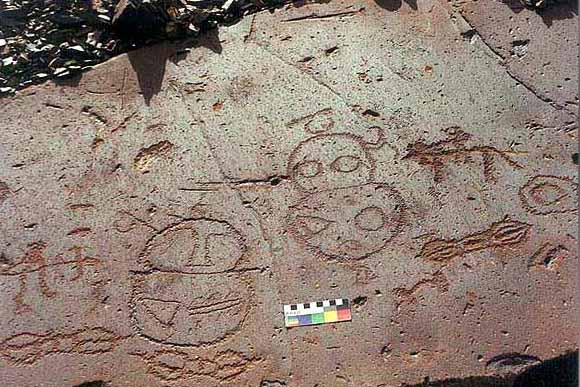
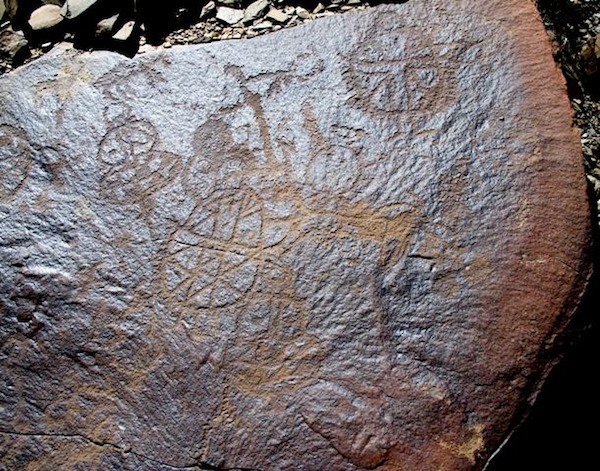
Generally throughout the Hindu/Buddhist religion the artifact is known as the Vajra, there are developed philosophical schools based upon it as a means to enlightenment, due to its indestructible, radiant qualities.
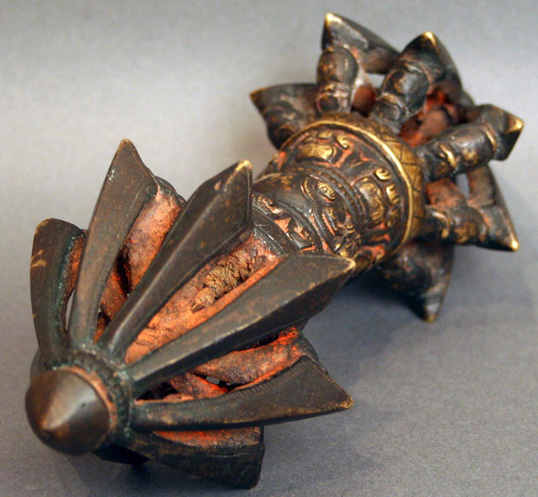
The Vajra

In my opinion though, the most interesting quality of the Tibetan Dorje was that it could generate inter-connected energy spirals, correspondant with portals of the horizon;
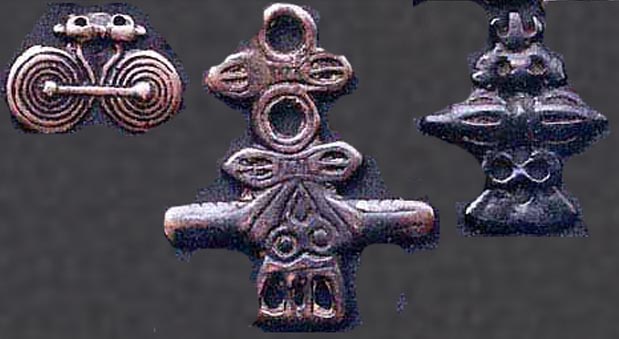
In terms of Western manifestation of the artifact, then it became the lightning generator of Zeus ruler of the Olympians, but this is far removed in time and place from the earliest known traditions, and thus doesn't appear to have many complex associations, as far as is known.

There is no easy answer as to how the tradition of this device developed, but it certainly made great impression as witnessed by the distance in time and place were understandings of it were maintained, it still being of supreme importance in some cultures, 5,000 years after first recording.
.

It needs to be considered how such traditions could have developed and whether such a device ever flew above the skies of the Earth in ancient times, of other wordly origin.
In tracing the history of this artifact and its representations, one finds the earliest mention dates back as far as writing itself, to the time of the Sumerians.
It is written about in connection with a campaign of the Sumerian city of Lagash in the 3rd millenium Bc, against the Elamite mountain dwellers on their Eastern border, and wielded by their God of war, Ninurta.
Here it is refered to as the Sar-Ur or Sharur.
The hero Ninurta led the march through the rebel lands. He killed their messengers in the mountains, he crushed their cities, he smote their cowherds over the head like fluttering butterflies, he tied together their hands with hirin grass, so that they dashed their heads against walls. The lights of the mountains did not gleam in the distance any longer.
People gasped for breath ; those people were ill, they hugged themselves, they cursed the Earth, they considered the day of the Asag's birth a day of disaster.
The lord caused bilious poison to run over the rebel lands. As he went the gall followed, anger filled his heart, and he rose like a river in spate and engulfed all the enemies. In his heart he beamed at his lion-headed weapon, as it flew up like a bird, trampling the mountains for him. It raised itself on its wings to take away prisoner the disobedient, it spun around the horizon of heaven to find out what was happening. Someone from afar came to meet it, brought news for the tireless one, the one who never rests, whose wings bear the deluge, the Šar-ur. What did it gather there …… for Lord Ninurta? It reported the deliberations of the mountains, it explained their intentions to Lord Ninurta
The mace snarled at the mountains, the club began to devour all the enemy. He fitted the evil wind and the sirocco on a pole), he placed the quiver on its hook An enormous hurricane, irresistible, went before the hero, stirred up the dust, caused the dust to settle, levelled high and low, filled the holes. It caused a rain of coals and flaming fires; the fire consumed men. It overturned tall trees by their trunks, reducing the forests to heaps, Earth put her hands on her heart and cried harrowingly; the Tigris was muddied, disturbed, cloudy, stirred up.
The birds there tried to lift their heads to fly away, but their wings trailed on the ground. The storm flooded out the fish there in the subterranean waters, their mouths snapped at the air. It reduced the animals of the open country to firewood, roasting them like locusts. It was a deluge rising and disastrously ruining the mountains.
"85-96: The Sharur, the heavenly mitum mace finished in gold and lapis lazuli. The exceedingly magnificent fifty-headed battle-mace who has no equal. The-enemy-cannot-escape, trustworthy in battle. The mighty general of the E-ninnu who in battle subdues all of the foreign lands. Crushes-a-myriad, whose presence is amazing. The hero who comes down from the great mountains. The Sharur, that which brings forth light like the day. The perfect weapon which consumes the rebellious land like fire. Obliterator-of-the-mountains, the maintainer of the people in heaven and earth. The tireless one who never sleeps. No-resisting-this-storm, a falcon against the foreign lands whose wing bears the deluge of battle. The right arm of Lagash whose awesome radiance covers the Land."
He embedded its Šar-ur weapon beside Lagaš like a big standard, placed it in its dreadful place, the Šu-galam, and made it emanate fearsome radiance. On the dais of Ĝir-nun, on the place of making judgments, the provider of Lagaš lifted his horns like a mighty bull.

Above we see Ninurta holding a seven headed representation of the Sarur, at this point it can be noted that when the 'mace' is in aggresive mode it's serpentine heads are splayed open, when in peaceful mode they are closed.
In considering the Sumerian texts we find the Sar-ur had many curious attributes, it could fly rapidly around the Heavens, gather intelligence and report back, through speech, cause mighty destruction through wind and fire, and radiated great light.
Surprisingly in the early rock art of Pre-Buddhist Tibet we see the Dorje represented not in connection with a mighty war God, but in association with curious little creatures of an unknown meaning;


Generally throughout the Hindu/Buddhist religion the artifact is known as the Vajra, there are developed philosophical schools based upon it as a means to enlightenment, due to its indestructible, radiant qualities.

The vajra has three qualities: it can never be used frivolously, it always fulfils its function of destroying the enemy, and it always returns into your hand. It is indestructible, adamantine.
The vajra, from which Vajrayana Buddhism takes its name, symbolizes the active male aspect of enlightenment often equated with skillful means, compassion, or bliss. The vajra evolved from the thunderbolt-scepter wielded by the Vedic god Indra.
In order to have intellectual understanding you have to see what is wrong with everything rather than what is right; that is the natural vajra intellectual quality, the critical attitude of the logical mind, which also brings solidity.
The Sanskrit term vajra means 'the hard or mighty one', and its Tibetan equivalent dorje means an indestructible hardness and brilliance like the diamond, which cannot be cut or broken. The vajra essentially symbolizes the impenetrable, immovable, immutable, indivisible, and indestructible state of enlightenment
The Vajra

In my opinion though, the most interesting quality of the Tibetan Dorje was that it could generate inter-connected energy spirals, correspondant with portals of the horizon;

In terms of Western manifestation of the artifact, then it became the lightning generator of Zeus ruler of the Olympians, but this is far removed in time and place from the earliest known traditions, and thus doesn't appear to have many complex associations, as far as is known.

There is no easy answer as to how the tradition of this device developed, but it certainly made great impression as witnessed by the distance in time and place were understandings of it were maintained, it still being of supreme importance in some cultures, 5,000 years after first recording.
Superb thread. This subject amazes me in many ways. Very interesting. Wonder how this stuff worked. Maybe its good that we dont know
reply to post by Kantzveldt
Never heard of that and I am also curious. How come Ancient Aliens repeated twice or three times the same things throughout the season and yet they haven't paid attention to this one.
Never heard of that and I am also curious. How come Ancient Aliens repeated twice or three times the same things throughout the season and yet they haven't paid attention to this one.
reply to post by midicon
A meteorite?
Hahaha!
Sounds a whole lot more like a nuclear armored drone to me.
A meteorite?
Hahaha!
Sounds a whole lot more like a nuclear armored drone to me.
reply to post by ImpactoR
Thats a good question, but the likes of Sitchin and Von Danekin never considered the Sumerian accounts of their super weapon, as far as i'm aware, let alone the little cute fellows found in the remote regions of Tibet in the rock art, masters of the Dorje.
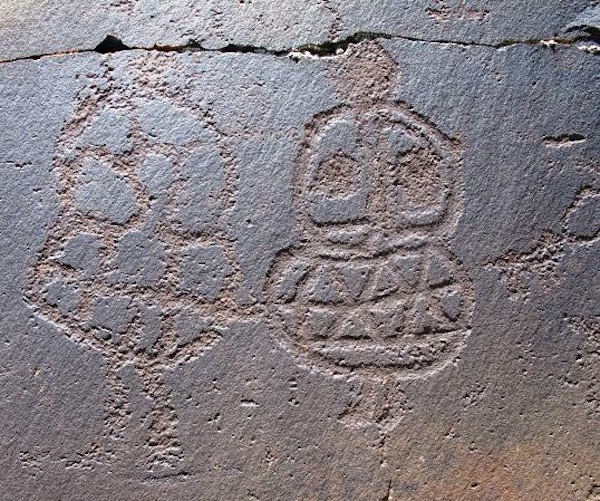
Thats a good question, but the likes of Sitchin and Von Danekin never considered the Sumerian accounts of their super weapon, as far as i'm aware, let alone the little cute fellows found in the remote regions of Tibet in the rock art, masters of the Dorje.

reply to post by midicon
A meteorite that will gather intelligence, take prisoners, and report back to it's owner...?
reply to post by TheDoctor46
Maybe we need to find a working version to figure that out, last reported sighting Lagash 5,000 years ago.
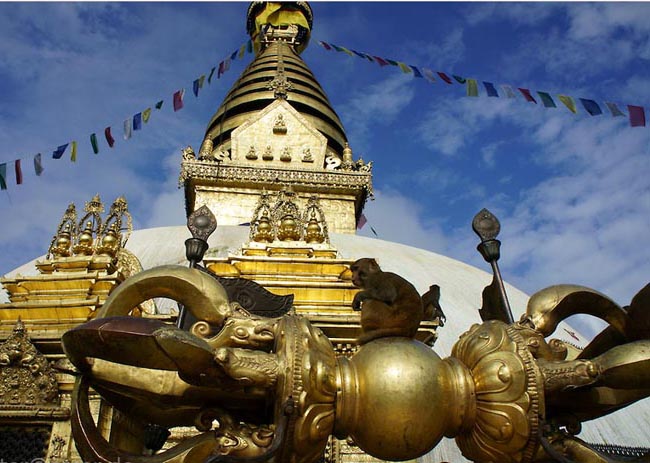
reply to post by Arken
Thanks for those...
A meteorite that will gather intelligence, take prisoners, and report back to it's owner...?
reply to post by TheDoctor46
Maybe we need to find a working version to figure that out, last reported sighting Lagash 5,000 years ago.

reply to post by Arken
Thanks for those...
edit on 11-1-2013 by Kantzveldt because: (no reason given)
Wonder what the hell happened to the dorje and masters of the dorje. With all that at there disposal i cant see them being wiped out in a hurry. Maybe
they died of boredom after taking out everyone else. One hell of a interesting subject what makes you want to dig deeper
reply to post by TheDoctor46
Perhaps other places to go, other things to do. There may be some indication though of where it was from, or seen as related, this is a Mudra trinket bearing a Dorje within the hand motif;
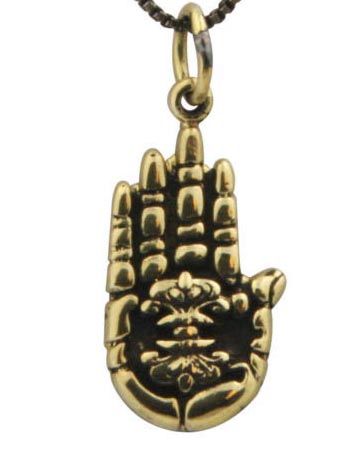
An eye is also commonly seen within the hand, were the hand relates to the Orion constellation and the eye the Orion nebula, place of first Heavenly creation to the likes of the Egyptians and Maya, and North American Indians as seen here;
www.abovetopsecret.com...
As can be seen there was a version of the Dorje in North American lore;
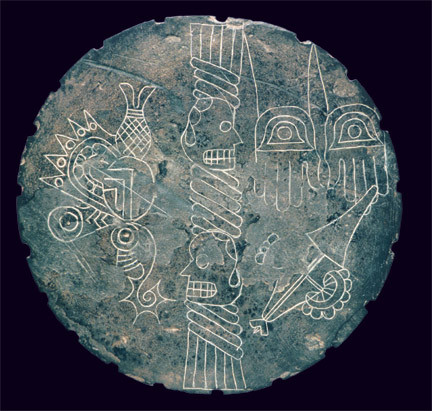
Perhaps other places to go, other things to do. There may be some indication though of where it was from, or seen as related, this is a Mudra trinket bearing a Dorje within the hand motif;

An eye is also commonly seen within the hand, were the hand relates to the Orion constellation and the eye the Orion nebula, place of first Heavenly creation to the likes of the Egyptians and Maya, and North American Indians as seen here;
www.abovetopsecret.com...
As can be seen there was a version of the Dorje in North American lore;

Here's what I'm talkin' bout Willis!

Not that it means anything, but I thought of this when I saw that.
Powerful explosion that is.

Not that it means anything, but I thought of this when I saw that.
Powerful explosion that is.
reply to post by Kantzveldt
What better way to discourage and unnerve your enemies than to promote a myth that you are all-seeing and powerful?
The fact that all of those great civilisations and empires fell belies the notion that they had such an impressive technology.
What are 'inter-connected energy spirals' in this context? What are 'portals' and how do horizons relate to them?
It needs to be considered how such traditions could have developed and whether such a device ever flew above the skies of the Earth in ancient times, of other wordly origin.
What better way to discourage and unnerve your enemies than to promote a myth that you are all-seeing and powerful?
The fact that all of those great civilisations and empires fell belies the notion that they had such an impressive technology.
the most interesting quality of the Tibetan Dorje was that it could generate inter-connected energy spirals, correspondant with portals of the horizon
What are 'inter-connected energy spirals' in this context? What are 'portals' and how do horizons relate to them?
An interesting website is www.ancientnuclearwar.com. Theres some pretty decent and possible theories on there if you read through it. Not totally
related to your thread but gives some possibilities of what may have happened back "in the day"
reply to post by Kantzveldt
you had me at awesome....this entire thread was awesome....you are awesome.
I always thought ancient ultimate weapons used in the great pre modern advanced wars were like nukes...I guess they were more like nuclear, multi function, hand held, AI drone type weapons.
Rocks.
you had me at awesome....this entire thread was awesome....you are awesome.
I always thought ancient ultimate weapons used in the great pre modern advanced wars were like nukes...I guess they were more like nuclear, multi function, hand held, AI drone type weapons.
Rocks.
edit on 11-1-2013 by zedVSzardoz because: (no reason given)
Originally posted by Kantzveldt
reply to post by TheDoctor46
Perhaps other places to go, other things to do. There may be some indication though of where it was from, or seen as related, this is a Mudra trinket bearing a Dorje within the hand motif;

reply to post by Kantzveldt
Think its possible what peoples before that had nuclear bombs and destroyed technology so civilization who left on earth started from stone age again. Now the same story coming again. Invention of nuclear weapon and planes who on ancient stones and all the same from start till humans will again blast themselves to stone age.
If the aliens have some super weapons im sure they greater than nuclear. Somethere readed what in some old uranian mine scientists discovered what that uran been used before for at least 7 nuclear stations thousands years before.
Think its possible what peoples before that had nuclear bombs and destroyed technology so civilization who left on earth started from stone age again. Now the same story coming again. Invention of nuclear weapon and planes who on ancient stones and all the same from start till humans will again blast themselves to stone age.
If the aliens have some super weapons im sure they greater than nuclear. Somethere readed what in some old uranian mine scientists discovered what that uran been used before for at least 7 nuclear stations thousands years before.
edit on 11-1-2013 by PropulsionX because: (no reason
given)
reply to post by Kantzveldt
Excellent and well put together thread!
It is my personal belief that the more we look into the mysteries of our past, we will find more and more evidence that points to ancient modern societies. Society, just as all things on earth, acts in a cyclical nature. We begin as a primitive society, later evolving into an advanced society. Once we have evolved into an advanced society, there is always the issues between the haves and the have nots. This is what we are beginning to see in our own society. This will eventually cause collapse, and we will become primitive again. The grand design of this is to help us to evolve to be the type of people who can live in an eternal society But that's a thread all in itself.
Great find and I enjoyed the post very much!
Excellent and well put together thread!
It is my personal belief that the more we look into the mysteries of our past, we will find more and more evidence that points to ancient modern societies. Society, just as all things on earth, acts in a cyclical nature. We begin as a primitive society, later evolving into an advanced society. Once we have evolved into an advanced society, there is always the issues between the haves and the have nots. This is what we are beginning to see in our own society. This will eventually cause collapse, and we will become primitive again. The grand design of this is to help us to evolve to be the type of people who can live in an eternal society But that's a thread all in itself.
Great find and I enjoyed the post very much!
reply to post by Kandinsky
I don't think any group claimed to possess such a weapon, it was the preserve of the Gods, to protect the peoples of the Heavens and Earth, according to the Sumerian text.
The spirals are understood as inter-connected fields of energy generated by the Dorje, not my suggestion per se, see here;
www.tcoletribalrugs.com...
I do note they are seen in conjunction with portals of the horizon, for what i mean by these i explained here;
www.abovetopsecret.com...
reply to post by TheDoctor46
Thanks, i'm not sure the energy involved with the Dorje is nuclear, though then again i'm not sure what it is....
reply to post by zedVSzardoz
Thats awesome thanks..!!!...a drone does best fit the description of the Sumerians, though i'm still considering those little tibetan figures might have been the crew...
reply to post by PropulsionX
Again, to be clear, i don't think humanity possessed such devices, they just happened to fight on behalf of Lagash against the Elamites, as curious an intervention as the Angels taking a sudden dislike to Sodom and Gommorah in the bible.
I don't think any group claimed to possess such a weapon, it was the preserve of the Gods, to protect the peoples of the Heavens and Earth, according to the Sumerian text.
The spirals are understood as inter-connected fields of energy generated by the Dorje, not my suggestion per se, see here;
www.tcoletribalrugs.com...
I do note they are seen in conjunction with portals of the horizon, for what i mean by these i explained here;
www.abovetopsecret.com...
reply to post by TheDoctor46
Thanks, i'm not sure the energy involved with the Dorje is nuclear, though then again i'm not sure what it is....
reply to post by zedVSzardoz
Thats awesome thanks..!!!...a drone does best fit the description of the Sumerians, though i'm still considering those little tibetan figures might have been the crew...
reply to post by PropulsionX
Again, to be clear, i don't think humanity possessed such devices, they just happened to fight on behalf of Lagash against the Elamites, as curious an intervention as the Angels taking a sudden dislike to Sodom and Gommorah in the bible.
edit on 11-1-2013 by Kantzveldt because: (no reason
given)
new topics
-
Biden FINALLY allows Ukraine to use US missiles inside of Russia.
General Conspiracies: 1 hours ago -
The Martian Lafayette Meteorite Interacted with Water Just 742 million years ago
Space Exploration: 6 hours ago -
My Body Of Release…
Philosophy and Metaphysics: 7 hours ago -
Well, here we go red lines crossed Biden gives the go ahead to use long range missiles
World War Three: 7 hours ago
top topics
-
Well, here we go red lines crossed Biden gives the go ahead to use long range missiles
World War Three: 7 hours ago, 25 flags -
Former DOJ charged with defrauding Rep. Matt Gaetz’s family over sex-crimes investigation
Propaganda Mill: 14 hours ago, 21 flags -
The Martian Lafayette Meteorite Interacted with Water Just 742 million years ago
Space Exploration: 6 hours ago, 7 flags -
My Body Of Release…
Philosophy and Metaphysics: 7 hours ago, 4 flags -
Biden FINALLY allows Ukraine to use US missiles inside of Russia.
General Conspiracies: 1 hours ago, 0 flags
active topics
-
RFK is Trumps health pick
2024 Elections • 12 • : WeMustCare -
My Body Of Release…
Philosophy and Metaphysics • 6 • : JJproductions -
The Great Reckoning
Rant • 55 • : VariedcodeSole -
Well, here we go red lines crossed Biden gives the go ahead to use long range missiles
World War Three • 80 • : CriticalStinker -
Don't cry do Cryo instead
General Chit Chat • 11 • : 727Sky -
Biden FINALLY allows Ukraine to use US missiles inside of Russia.
General Conspiracies • 1 • : elevatedone -
Satanic ‘Little Season’ of Deception.. Awaken to the Handiwork of the Creator.
ATS Skunk Works • 13 • : rickymouse -
Encouraging News Media to be MAGA-PAF Should Be a Top Priority for Trump Admin 2025-2029.
Education and Media • 71 • : Coelacanth55 -
Alex Jones Reinstated on X
Education and Media • 89 • : 777Vader -
Former DOJ charged with defrauding Rep. Matt Gaetz’s family over sex-crimes investigation
Propaganda Mill • 24 • : WeMustCare
